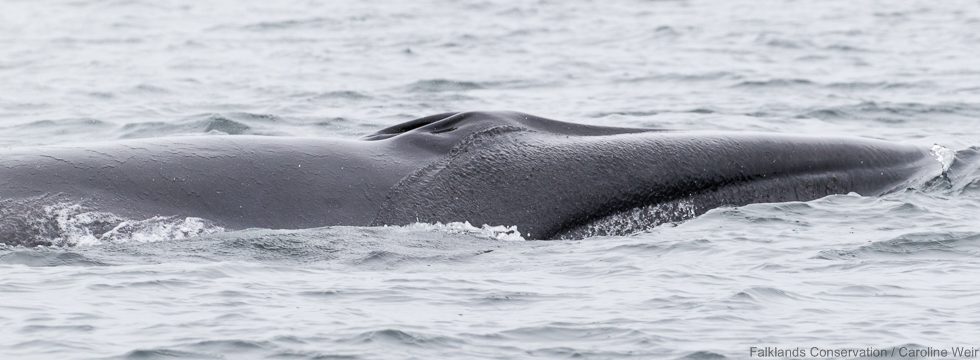Sei whale research
Sei whales (Balaenoptera borealis) are currently classified as globally Endangered by the International Union for Conservation of Nature, due to heavy exploitation and population decline during commercial whaling operations in the 1900s. Relatively little is understood about the modern-day distribution and ecology of sei whales worldwide, since in many geographic regions they are found primarily in offshore habitats and their occurrence can be less predictable than other baleen whale species – both factors making the species costly and logistically-challenging to study.
Southern Hemisphere sei whales have been increasingly observed in the coastal waters around the Falkland Islands (south-west Atlantic) since the 1990s, providing the opportunity to initiate one of the first targeted field studies of the species globally. Caroline has worked in the Islands for Falklands Conservation since 2016, initially carrying out a baseline survey of sei whales during the 2017 field season and then continuing to develop the research programme with a range of experienced project partners over the subsequent years. The work carried out on sei whales to date includes:
- Visual surveys of spatio-temporal distribution and abundance using shore, vessel and aerial platforms;
- Photo-identification work to identify individual whales and investigate their movements, population size, and associations;
- Satellite tracking to collect data on movements, habitat use, and dive behaviour;
- Faecal sampling to examine diet, parasites and to extract whale DNA;
- Biopsy sampling to collect small tissue samples to carry out genetic, stable isotope and hormone analysis;
- Acoustic monitoring to characterise the vocal repertoire of sei whales and assess their temporal occurrence;
- Behavioural work to assess the dive times and surfacing characteristics of sei whales around the Falkland Islands;
- Suction-cup tagging to document foraging behaviour;
- Unmanned aerial vehicle (or ‘drone’) work to assess body condition and health (commencing in 2024);
- Attendance of sei whale strandings to collect data on morphology, tissue samples and causes of death.
In combination, the work is providing a large amount of novel systematic information on sei whale occurrence that can be used to inform conservation and management decisions. The data have already been used to successfully recognise the Falkland Islands Inner Shelf Waters as both a Key Biodiversity Area (KBA) and as an Important Marine Mammal Area (IMMA) for sei whales, highlighting the global significance of Falklands’ waters for the species. Outputs from the ongoing work, including scientific papers, will be listed below as they become available.
Core funders of the Falklands’ sei whale research have included Falklands Conservation, EU BEST 2.0, the Royal Society for the Protection of Birds, Falkland Islands Government and Darwin Plus (DPLUS082 and DPLUS126).
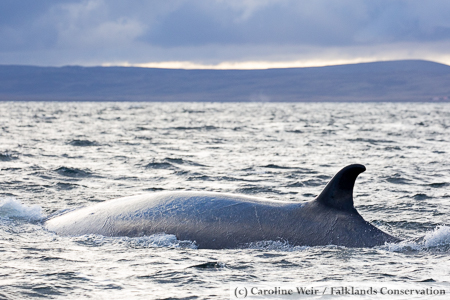
Sei whale surfacing in Berkeley Sound, Falkland Islands.
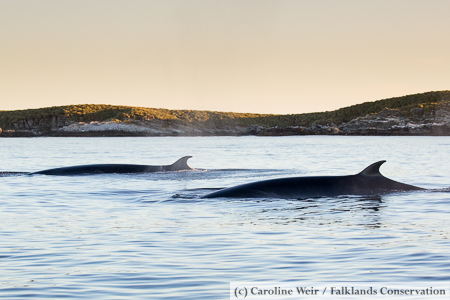
Two sei whales close to the coast in the Falkland Islands.
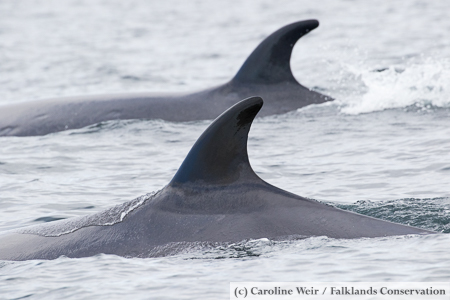
Sei whale dorsal fins.
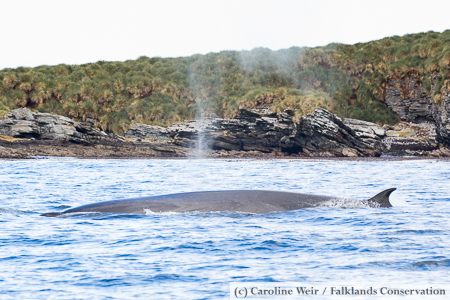
Sei whale travelling along the coast.
Publications and downloads
- Weir, C.R. (ed.) (2025). Distribution, abundance and movements of sei whales and southern right whales in the Falkland Islands. Technical Report for DPLUS126. Falklands Conservation, Stanley, Falkland Islands. Version 2, 31 January 2025. 236 pp.
- Sei Whale CMP (2024). Conservation Management Plan for the sei whale (Balaenoptera borealis) in the Falkland Islands. Falklands Conservation, Stanley, Falkland Islands. September 2024.
- Cerchio, S. and Weir, C.R. (2022). Mid-frequency song and low-frequency calls of sei whales in the Falkland Islands. Royal Society Open Science, 9(11): 220738 http://doi.org/10.1098/rsos.220738
- Weir, C.R. (ed.) (2022). Conserving Falklands' whale populations: addressing data deficiencies for informed management. Technical Report for DPLUS082. Falklands Conservation, Stanley, Falkland Islands. Version 2, 30 Oct 2022. 231 pp.
- Prieto, R. and Weir, C.R. (2022). Sei whale Balaenoptera borealis Lesson, 1828. In: Hackländer, K., Zachos, F.E. (eds) Handbook of the Mammals of Europe. Handbook of the Mammals of Europe. Springer, Cham. https://doi.org/10.1007/978-3-319-65038-8_86-1
- Weir, C.R. (2021). Supporting evidence for the proposal of Falkland Islands Inner Shelf Waters as a KBA for endangered sei whales (Balaenoptera borealis). Falklands Conservation, Stanley, Falkland Islands. 36pp.
- Segre, P.S., Weir, C.R., Stanworth, A., Cartwright, S., Friedlaender, A.S. and Goldbogen, J.A. (2021). Biomechanically distinct filter-feeding behaviors distinguish sei whales as a functional intermediate and ecologically flexible species. Journal of Experimental Biology, 224(9): jeb238873. https://doi.org/10.1242/jeb.238873
- Weir, C.R., Taylor, M., Jelbes, P.A.Q., Stanworth, A. and Hammond, P.S. (2021). Distribution and abundance of sei whales off the west coast of the Falkland Islands. Marine Mammal Science, 37: 919–933. DOI: 10.1111/mms.12784
- Baines, M. and Weir, C.R. (2020). Predicting suitable coastal habitat for sei whales, southern right whales and dolphins around the Falkland Islands. PLOS ONE 15(12): e0244068. https://doi.org/10.1371/journal.pone.0244068
- Weir, C.R., Oms, G., Baracho-Neto, C.G., Wedekin, L.L. and Daura-Jorge, F.G. (2020). Migratory movement of a sei whale (Balaenoptera borealis) between Brazil and the Falkland Islands (Malvinas). Marine Mammal Science, 36: 1050–1057. DOI: 10.1111/mms.12687
- Weir, C.R., Stanworth, A., Cartwright, S., Jelbes, P.A.Q., Taylor, M. and Pompert, J. (2019). Distribution and movements of sei whales (Balaenoptera borealis) on coastal feeding grounds in the Falkland Islands (Malvinas). World Marine Mammal Conference, Barcelona, Spain, December 2019. Download here.
- Buss, D., Jackson, J. A., O’Connell, T.C., Goodall-Copestake, W.P., Carroll, E.L., Foote, A., Barnes, I., Brace, S., Stowasser, G., Trathan, P., Jelbes, P.A.Q, Taylor, M., Stanworth, A. and Weir, C.R. (2019). Understanding diet, past and present: Insights into the foraging ecology of Falkland Island sei whales using DNA metabarcoding and stable isotope analysis. World Marine Mammal Conference, Barcelona, Spain, December 2019.
- Weir, C.R., Taylor, M., Jelbes, P.A.Q. and Stanworth, A. (2018). Cue rates and surfacing characteristics of sei whales (Balaenoptera borealis ) in the Falkland Islands. Journal of Cetacean Research and Management, 19: 43–55.
- Weir, C.R. (2017). Developing a site-based conservation approach for sei whales Balaenoptera borealis at Berkeley Sound, Falkland Islands. Falklands Conservation report. Version 1.0, September 2017. 115 pp.
- Weir, C.R. (2018). A preliminary assessment of endangered sei whales (Balaenoptera borealis) in two candidate Key Biodiversity Areas in West Falkland. Falklands Conservation report. Version 1.2, 3 September 2018. 128 pp.
All content and images are copyright Caroline R. Weir (2025)

